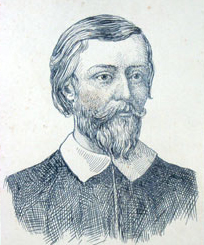
By F. Briguiet [Public domain], via Wikimedia Commons
Book Collection Review, “Seleção de Obras Poéticas” by Gregório de Matos
Matos is a popular figure in Portuguese literature. Unfortunately, the critical forum he keeps for debate and vigor doesn’t always outweigh his morality since it’s built up of mistaken beliefs. He’s similar in some respects to Malthus, a critic who thinks the entire humanity on Earth is a consumer which only grows out of vice and misery. And with typo errors and lack of resources for translating Portuguese into English there’s going to be more than just a headache. I’ve confirmed some suspicions at least. Readers of Portuguese aren’t likely going to be the ones at large who can translate Matos while being honest about his disposition for readiness and insipidity, as the case will be heard when researchers at academies feel like translating dirty words with honesty, integrity, and intelligence. Even a word like “ruins” refers to tragedy and violence in our world. Then again, did Matos ever use the word? Maybe I’ve inched closer to the truth, but who’s to say everyone is evil? I believe people can have evils and goods. And how can insolence permit all good things in the world if some good things refer more to disinterest than to roughness on pinpointed accuracy? Matos probably speaks so much criticism while losing concentration on his poetry; I’m justified for this belief: I can create literature like his. My own writings may have statements like “pay no heed to readers with automatic opposition” or “alter the petal into cause within grace and fortitude”. Okay, maybe except for the latter quote. Matos certainly understands flow to beauty although this abruptness he’s in pulls readers under the critical teeth of refutals. He’s funny about healthy accommodations, too. So I guess there’s going to be nothing but evil in him according to his irrational beliefs, as evil permits ignorance until inexperience hurts the grace. That… doesn’t make sense. Above the ground where I’m sitting there’s more poems than meets the eye and less criticism than what can be allowed under my radar, or thinking cap, or big giant letter grades, for, through and through, Gregório may be aware of the story of Adam and Eve but his irreligious endeavor appears to let him disregard all the virtues of the world as things, or coins, with nothing but evil and terrible consequences. Religion should not be confused with fashion on religion. It’s the latter which is more likely to make people mistakenly believe that there’s nobody but evil people in the world; such a dark philosophy (or scary poetry) results in our population’s scrooges and money-changing holes for vice and misery. What can thus be verified is that one side of Mato’s makes him a fluid, romantic, gullible poet, and that the other side of Mato’s makes him a rude duck who quacks a lot. Really? We’re all evil and offer good things during impoliteness we can’t conceive evil of? Come on!
https://en.wikipedia.org/wiki/Gregório_de_Matos
No comments:
Post a Comment